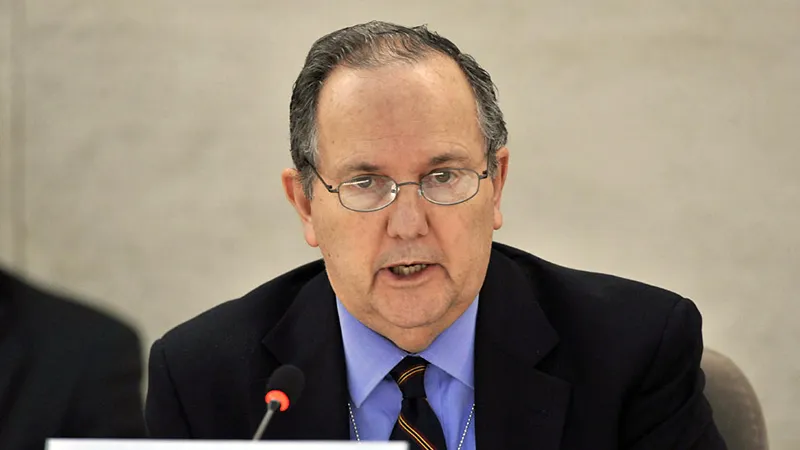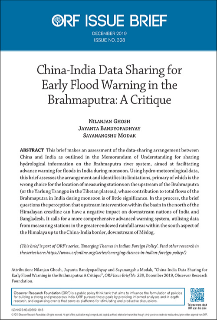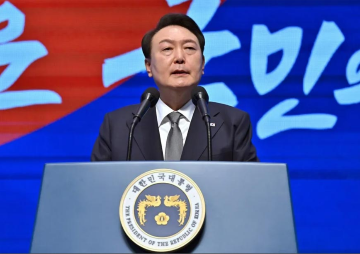Recently in Colombo, UNHRC expert Juan E. Mendez has called for reforms to Sri Lanka’s police, legal and judicial systems, obviously on the lines sought in the co-sponsored UNHRC resolution of September 2015. A Special Rapporteur on Torture, Mendez, has also said that custodial torture, including sexual abuse, has continued post-war.
Mendez has specifically referred to the years immediately after the war when President Mahinda Rajapaksa continued in power. It is unclear if he was also referring to the past one and half years under the twin leaderships of President Maithripala Sirisena and Prime Minister Ranil Wickremesinghe. However, he has expressed the hope that the government of President Sirisena would end rights abuses and would deliver on the promises of ‘war-time accountability issues’.
The government’s initial reaction was lukewarm, as was to be expected under the circumstances. After facilitating Mendez’ visit to the ‘war-zone’ and his meetings with ‘torture’ and other war victims, Deputy Foreign Minister, Dr. Harsh de Silva, said that the government would study Mendez’ report before commenting on it.
If what the Rapporteur is saying is correct, it is unlikely that the government, at the appropriate levels, was/is unaware of the same. There is no war to be fought, and no facts to be hidden from the public eye or the higher-ups in the government, that they did not know.
If however there is lack of action on fresh incidents of torture — if any — they need to be probed, too, to know the reasons and circumstances. Not that ‘torture’ is still on. It’s so even if under the UN Charter there are powerful nations who can distinguish between ‘your torture’ and ‘our torture’. They have had distinguished between ‘your terrorist’ and ‘our terrorist’.
Anti-terror law
Mendez has also reiterated the continuing demand of the international community for the nation to repeal the otherwise draconian Prevention of Terrorism Act (PTA). Independent of the UN official’s visit but around the time all the same, PM Wickremesinghe has reiterated the government’s earlier commitment in this regard.
PM Wickremesinghe has talked about a new anti-terror law, based on international conventions. President Sirisena is away in London, participating in the two-day anti-terror conference being called by British PM David Cameron. Former President Chandrika Bandaranaike Kumaratunga, heading the post-poll government’s reconciliation task force, has addressed a UN special session the topic in New York HQ.
The government seems to be putting its act together, or so it seems — or, so it also wants the world to believe. Will either be enough — that is what the government says and/or does on the one hand, and what the UN and other organs of the ‘international community’ expect and rule upon. In the past, such rulings viz Sri Lanka had been based on unsubstantiated charges conferred respect by ‘unofficial’ documentation like the Darusman Report.
It’s anybody’s guess what the proposed law would be until a draft is put up for national and/or parliamentary discourse. It might even require a judicial clearance, pre facto or post facto, but it’s too early even to speculate. There can however be many a slip between the cup and the lip — if there are more arrests of ex-LTTE cadres and facilitators, with intent to hurt the nation and national assets, national leaders and the nation’s population.
It’s again another area where speculation could do immense damage than any good. It needs no speculation that higher the number of arrests and greater the quantum of weapons seizure in the coming days, weeks and months, lesser are the chances of Parliament passing any ‘toothless law’ in PTA’s place. Lesser still would be the chances of the legislature agreeing to any government proposal for repealing the PTA. It’s too sensitive a security issue than just a ‘competitive majority’ political issue, as some in the international community would want to believe. It would be worse still for the Tamil polity nearer home and the Diaspora overseas to convince the rest of the nation than they could (have) convince(d) the international community.
In nobody’s interest
It’s in nobody’s interest that Sri Lanka should continue to have an archaic law on terrorism continuing in the statute book, that too years after the war is over. The change of law would also reflect a change of mind-set on the side of the Sri Lankan State and its apparatuses. It would also prepare the change of individual mind-set, particularly in the enforcement agencies, both at the institutional and individual levels.
Yet, there is no way any government in power for some more years to come would be convinced that the nation could do without an anti-terror law on its statute book. It would be even more so that the enforcers of such a law would abide as much by the spirit of the law as by its letter.
It’s not that the enforcers of any new anti-terror law would be unwilling to learn or unlearn, as the case may be. They too have come a long way since the ‘Boosa camp’. They too have left behind the disturbing memories of the bloody war and what all it entailed and enshrined, wily-nily.
But the climate should be conducive for ‘em all to think afresh and learn afresh. It can happen only when the Sri Lankan State as an institution and the law-enforcers at the level of the individual is convinced that they would not have to return to the days and decades of war and violence, militancy and terrorism.
There is no denying that the LTTE torture-camp leaders did learn a lot from their counterparts in the early days. There is even more reasons to believe that in the subsequent era, the reverse became the truth. The learning curve is worth un-learning, not re-learning.
The LTTE had killed and maimed, burnt and roasted its victims, not all of them security forces personnel. Many of the LTTE victims, whether killed or tortured, through and through were fellow Tamils — militant rivals and ordinary citizens. There were respected representatives of what are now even more respectably dubbed the ‘civil society’.
It’s sad still that all those civil society voices talking against ‘torture’ and ‘terrorism’ are weak when it comes to talking about the LTTE, long after their purported fears and anxieties had been erased — wholly, not just partially. They thus may have more questions to answer, if and when asked, than asking others for answers to their own questions.
Continuing confusion
The confusion on the government side continues unabated. Earlier, Minister, Field Marshal Sarath Fonseka, indicated within the safe precincts of Parliament that the suicide-attack on then defence secretary, Gotabhaya Rajapaksa’s life was an ‘insider job’. A day or two later, the court heard the case against LTTE cadres accused in the case, and the new government as an institution had nothing to say on it.
Now again, it’s the turn of Kumaran Pathmanathan alias KP, once acknowledged as the LTTE fund-raiser and arms-procurer. The present government has reiterated the predecessor’s court claims that KP was not involved in any terror-act. If so, why did some present-day rulers claim that their predecessors had facilitated KP’s early exit without proof even as the presidential vote-count was still on?
If raising funds and procuring weapons for a terror organisation of the LTTE kind was/is not an ‘act of terror’, what’s it? How then is the government going to define and describe ‘terrorism’ in the new law that PM Wickremesinghe has promised? It’s another matter KP is still wanted in neighbouring India for the Rajiv Gandhi assassination, and officially so.
Alongside appear news reports of a Batticaloa court extending the remand of former Eastern Province Chief Minister, Sivanesanthurai Chandrakanthan alias Pillaiyan, for the Christmas Day killing of TNA parliamentarian Joseph Pararajasingham in 2015. The case does not seem to have made any forward movement since Pillaiyan’s arrest in October 2015.
The contradiction is striking. If Pillaiyan can be charged with this killing or any other of the LTTE, where should/would the bug stop? Should it go back to the LTTE, was it an LTTE killing, on which the Rapporteur (too) may have something to say? If not, and if it was a personal killing, like many others, and also proved against Pillaiyan still, would it qualify for ‘war crimes’ and ‘accountability probe’? If it’s the larger matrix, why is it being singled out for a criminal case treatment, and not a ‘war crime probe’?
Special Rapporteur Mendez was reported to have spoken also about authorities continuing to harass ‘rehabilitated’ ex-LTTE cadres. There cannot be more prominent examples of them then Pillaiyan and KP, apart from former central minister, Vinayagamurthy Muralidharan alias ‘Col’ Karuna. Pillaiyan has been hauled up (otherwise rightly so, if proved) for the Pararajasingham killing and the JVP has moved the court for KP’s prosecution. What then is ‘rehabilitation’ of the kind all about – where does it begin or end, or whatever?
This commentary originally appeared in Th< class="aBn" tabindex="0" data-term="goog_725800498">< class="aQJ">e Sunday Leader.
The views expressed above belong to the author(s). ORF research and analyses now available on Telegram! Click here to access our curated content — blogs, longforms and interviews.




 PREV
PREV


